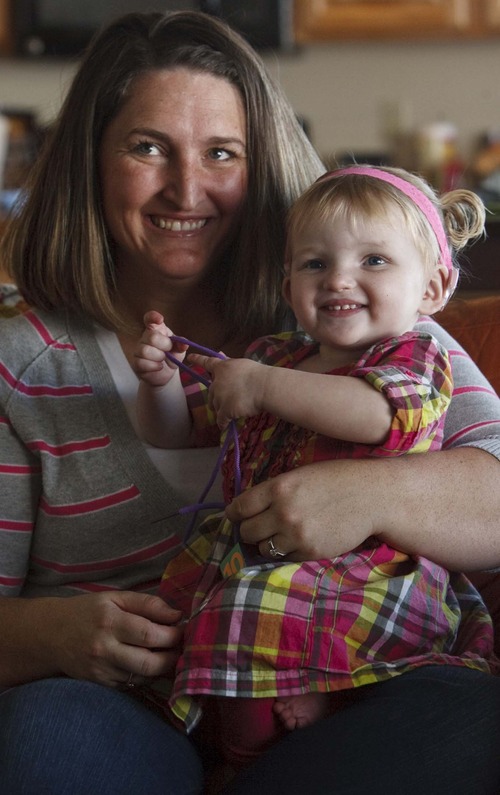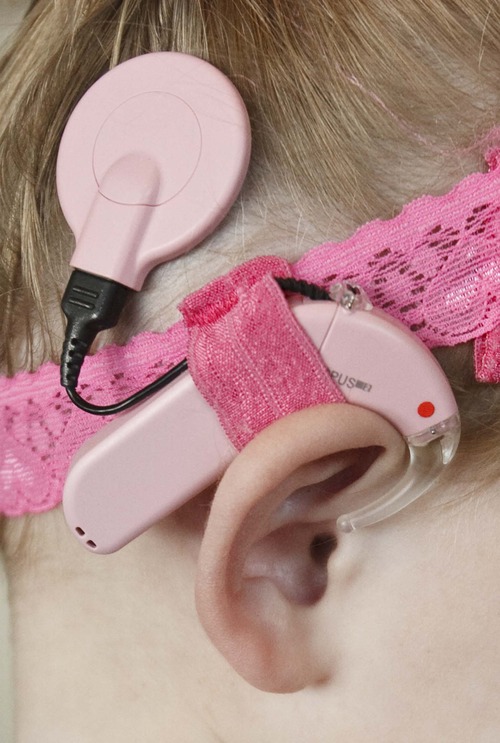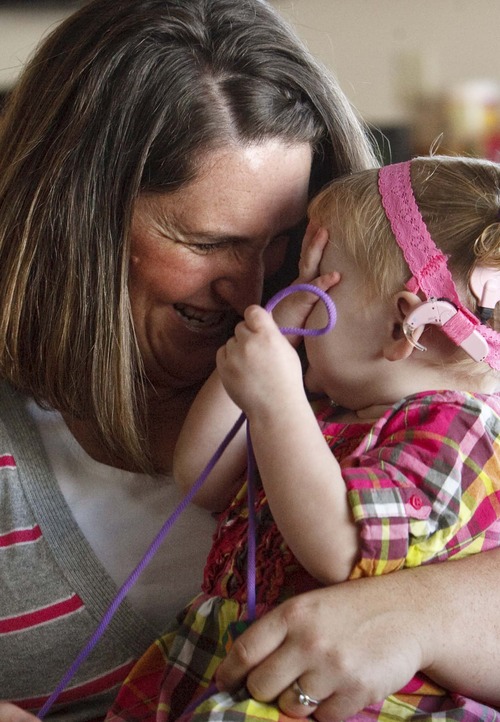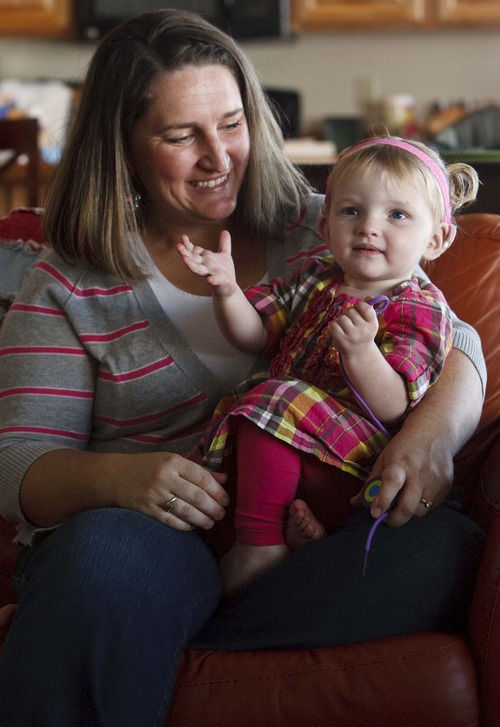This is an archived article that was published on sltrib.com in 2013, and information in the article may be outdated. It is provided only for personal research purposes and may not be reprinted.
When she was pregnant, Sara Doutre was screened to see if her child had Down syndrome. She knew to take folic acid to prevent her child from developing spina bifida.
But the real problem was a common virus the former special education teacher had never heard of.
Doutre did not know her daughter had become infected with cytomegalovirus (CMV) while in the womb. Daisy, now almost 2, recently became deaf because of the infection, which can also cause mental disabilities and death in some children.
The Willard mother is now pushing for state legislation that would require pregnant women be told about the virus and taught how to take precautions, along with other actions to raise awareness of CMV.
Doutre's mother, Rep. Ronda Menlove, R-Garland, is sponsoring the bill.
The virus is usually harmless to healthy adults and children who become infected. But it can cause serious disease in babies infected before birth. Nationally, 5,000 children a year develop permanent problems, most commonly hearing loss, according to the Centers for Disease Control and Prevention.
The virus causes more long-term problems and childhood deaths than Down syndrome, fetal alcohol syndrome or neural tube defects, the CDC reports.
"It's an important public health issue that needs to be publicized," said Menlove.
HB81 would require the Utah Department of Health to create a public education campaign to inform pregnant women and women who may become pregnant about the virus, the birth defects it can cause and how to avoid it.
Pregnant women most commonly come in contact with the virus through sexual contact and through the saliva and urine of young children, according to the CDC.
The agency recommends precautions that include hand washing after changing diapers, feeding children, wiping their nose or drool and handling their toys. It also advises pregnant women not to share food, drinks or utensils with their young children, and to clean surfaces that come into contact with children's urine or saliva.
Menlove said the bill would also require that infants be tested for the virus if they fail two hearing screenings. Such testing is now recommended.
But some children who pass the screenings will go on to develop hearing loss due to CMV, according to Albert Park, a pediatric ear, nose and throat specialist at the University of Utah who treats children with CMV and researches the virus.
Park, one of the doctors who treated Daisy, was unfamiliar with Menlove's bill and declined to comment on the specifics, though he agreed families should know more about it.
Park said the virus is believed to be the most common cause of hearing loss. Some 15 percent of children who are infected in utero will lose some or all of their hearing. Park estimated that 30 Utah children a year have CMV-related hearing loss, but currently just one to two are detected at birth.
The requirements in Menlove's bill would detect about 10 children, he estimated. To catch them all would require testing all newborns for CMV, which he estimates would cost Utah $6 million just for the saliva tests. He is seeking funding to study the costs of testing children at various ages for the virus.
Another national study, which is enrolling Utah women, is looking at whether pregnant women should be screened for the virus. That isn't routine practice now, and there is no consensus on how to treat infected women or whether it will help their babies.
The randomized trial will study whether infected women treated with CMV antibodies will reduce the number of babies infected with the virus.
So much research is going into CMV that Park suspects either screening women or newborns will eventually become routine.
He recommended women talk to their doctors about getting themselves or their newborns tested.
"If I was a parent, and knowing the existence of this virus, I agree I would [want] to be tested," he said.
When Daisy failed her two hearing screens, one after birth and another 10 days later, Doutre said, "No one mentioned anything about it [CMV] to us. I didn't know it existed at that point."
Months later Daisy was tested again and passed. She developed normally, babbling and cooing.
But she started to have ear infections when she was about 16 months old, and tests showed slight hearing loss. "I would open the door and come in her room and start talking," Doutre recalled. "Once she saw me she would be absolutely startled."
The family sought out an ear, nose and throat doctor to place tubes in her ears. The specialist suspected CMV after learning that an ultrasound while Doutre was 34 weeks pregnant showed enlarged ventricles in Daisy's brain.
An MRI when she was 2 days old showed Daisy did have cysts in her brain but would not have an intellectual disability. The abnormalities found in the ultrasound and MRI can be linked to CMV, but Daisy was spared such a disability because Doutre was probably infected later in her pregnancy.
"If I had known [about the virus]," she said, "I would have been much more careful" about hand washing and not sharing utensils with her then-toddler son.
Daisy tested positive for the virus, and an analysis of her newborn blood spot test showed she contracted it while in the womb.
Because CMV is a herpes virus, it remains dormant in the body for life, like the virus that causes cold sores. Children can have no symptoms for years, and then develop problems up to age 6.
Daisy lost her hearing quickly. Two months after the tubes were placed, she had lost all hearing in her right ear. A month later, in November, she was completely deaf.
There is no proven treatment for babies born with CMV. Antivirals are being used experimentally to prevent hearing loss and developmental delays, or to halt the progression of disease.
The CDC says vaccines are in the research and development stage.
Doutre said they sought out Park and tried an experimental antiviral treatment for Daisy, but it didn't work. She wonders if it would have, had she known from the beginning about CMV.
"Part of me feels like, had we known sooner, we probably would have been able to do something about it," she said.
She knows she is lucky: Her family had the insurance coverage to pay for cochlear implants, which cost $160,000. Daisy received them in December. Doutre was a special education teacher and, with her parents' help, she was able to quickly find resources such as speech therapy and parenting classes.
"She's got everything she needs and she got it really quickly," Doutre said, adding that she wants other parents to have the same chances by learning early about the virus. "Not everyone will have those resources." —
About CMV
It's common: Up to 80 percent of adults are infected by the time they are 40 years old.
Most healthy children and adults who are infected have no symptoms.
1 percent to 4 percent of women will first become infected during pregnancy, when the virus is most dangerous. Among those women, about a third will pass the virus to their fetus.
1 in 150 children is born with CMV infection; 20 percent of those children will develop permanent problems such as hearing loss or developmental disabilities.
Source: Centers for Disease Control and Prevention













